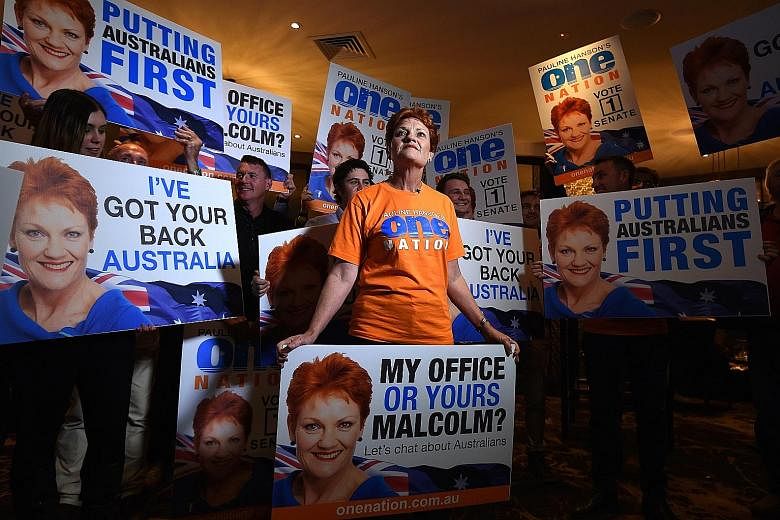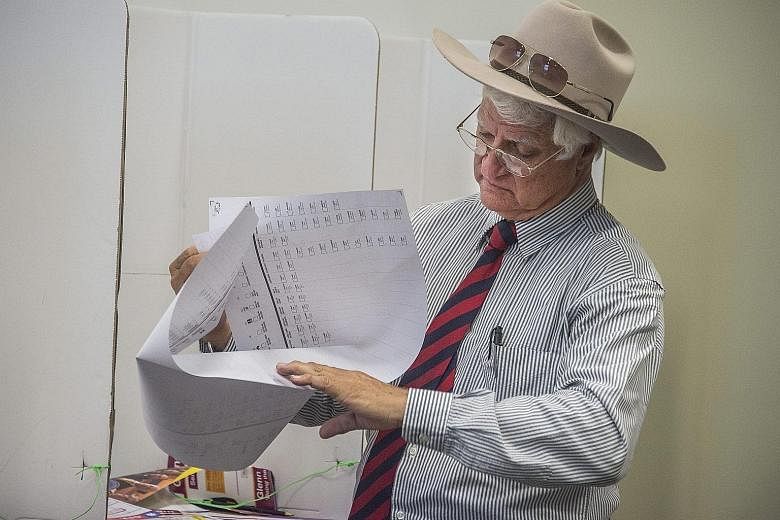Australia's shock election result has produced an extra surprise: the notorious right-wing firebrand, Ms Pauline Hanson, is back.
Famous for her attacks on Asian immigration during her term as an MP in the 1990s, Ms Hanson looks set to return to Parliament as an Upper House member following last Saturday's election.
As vote counting resumes today, Ms Hanson's Queensland-based One Nation party is expected to pick up two to three seats in the Upper House.
With no party likely to win a majority in the Upper House, or Senate, it is set to be an unruly chamber which could block the agenda of whichever party eventually forms government.
Ms Hanson is likely to be joined in the Senate by a range of minor parties and unconventional candidates, including the party led by anti-gambling crusader Nick Xenophon. Other possible winners include controversial broadcaster Derryn "the human headline" Hinch, conservative Christian minister Fred Nile, and outspoken Tasmanian MP Jacqui Lambie, whose party may win two seats.
-
What next?
-
Australia's two major parties have so far failed to win a majority in the 150-seat House of Representatives to rule outright after national elections on Saturday, with a result not likely for several days. Here's how things stand now:
The Australian Electoral Commission has counted less than 80 per cent of the ballots. Millions of postal and absentee votes are still being processed, with counting to re-commence on Tuesday after they are sorted and returned to each electoral district. This is the earliest that a result could emerge, but it may take weeks.
The Australian Broadcasting Corporation has put the ruling coalition just behind thus far with 65 seats to Labor's 67. It predicted that five would go to independents or smaller parties, with 13 seats in doubt.
If neither of the two main players - the Liberal/National Coalition or Labor - wins 76 or more Lower House seats, there will be a hung Parliament. A hung Parliament is where no single political party has a majority in the Lower House of Representatives. This last occurred in 2010 when the centre-left Labor party of Ms Julia Gillard formed the first minority government since World War II with the support of independents.
Experts say hung Parliaments can be brittle and sometimes do not last the three-year full term.
The prospect of a hung Parliament has shone a spotlight on potential kingmakers - independents and politicians from minor parties who have won Lower House seats and whose support may be needed for a government to be formed. So far there are five. It potentially makes them very powerful, with the government likely to offers deals to form an alliance or offer support for their minority agendas to secure their backing.
Mr Bob Katter is an independent MP and a maverick rural politician who supported the Liberal/National Coalition when they were in opposition in 2010 and is open to working with them again. Another independent, Senator Nick Xenophon, recently established his own party which has secured a seat through candidate Rebekha Sharkie. Mr Xenophon is a centrist and anti-gambling campaigner and has said he is open to negotiation.
The Greens have one representative in Mr Adam Bandt and could potentially have another. Both the Liberals and Labor have previously ruled out forming a multi-party government with them, but they may now have no choice. The Greens said it was "inconceivable" they could form a government with the conservative coalition.
Farmer Cathy McGowan and former intelligence officer Andrew Wilkie are both independents and have declared that they have no intention of helping any of the major players form a government.
AGENCE FRANCE-PRESSE, BLOOMBERG
Ms Hanson, 62, a controversial figure who was briefly jailed in 2003 for electoral fraud charges which were later quashed, pledged yesterday that she would not be an "obstructionist".
"I remember coming out of prison and saying I'd have rocks in my head to actually go back and do it again," she said.
"But the support I've received from Australians... and the encouragement I've received from the Australian people is why I've kept going."
Since her term as a Lower House MP from 1996 to 1998, Ms Hanson has largely shifted her focus from attacking Asian migrants to criticising Islam. She wants to restrict overall migration and to hold a royal commission into Islam.
In May, she told the media that Australia was "in danger of being swamped by Muslims".
During the televised election counting on Channel Seven last Saturday night, Labor MP Sam Dastyari playfully invited Ms Hanson to "join me in Sydney and I will take you out for a halal snack pack... whenever you want". The snack pack, which has developed a strong following on social media, is a takeaway mix of halal kebab meat, chips and sauce.
However, Ms Hanson was in no laughing mood, immediately rejecting the meal offer and insisting she "does not believe in halal certification".
"It's not happening," she said. "I'm not interested in halal."
Ms Hanson's One Nation party was expected to receive about 10 per cent of the votes in Queensland for the state-based Senate. Her party may win one or two seats in Queensland and also has a chance of a seat in New South Wales.
Australian parties rarely hold a majority in the Senate, which is based on proportional representation. Hoping to make it easier to pass measures such as a stalled anti-corruption Bill, Australia's Prime Minister Malcolm Turnbull opted in May to hold a double-dissolution election - IN which all 76 senators are up for re-election, rather than half, as is the norm.
But the move has spectacularly backfired and the Senate looks set to be made up of an assortment of small parties and independents.
The Liberal-National ruling coalition is expected to win 30 to 34 seats in the Senate, compared with 33 previously, with Labor set to win 23 to 27, compared with 25. The Greens are expected to dip from 10 senators to eight or nine.



